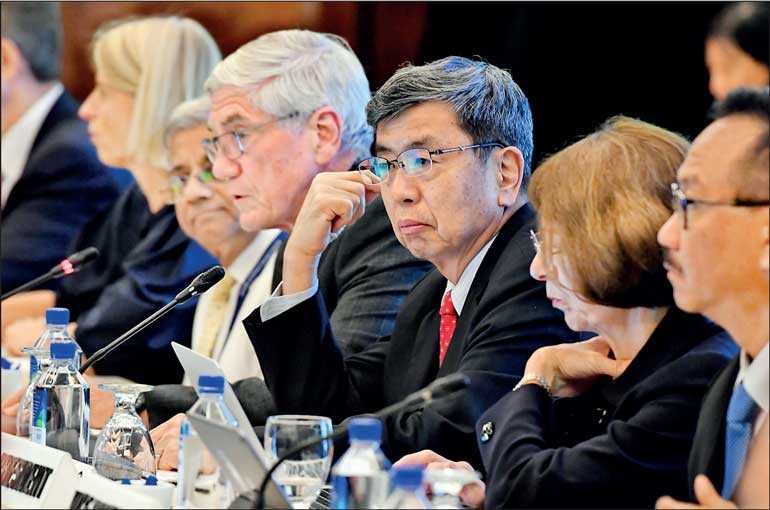Wednesday Feb 18, 2026
Wednesday Feb 18, 2026
Friday, 3 May 2019 00:00 - - {{hitsCtrl.values.hits}}

Nadi, Fiji: The Asian Development Bank (ADB) continues to deliver on its goal of achieving a more prosperous, inclusive, resilient, and sustainable Asia and the Pacific through increased development finance, more efficient strategic operations, and enhanced focus on partnerships and collaborations, says a new ADB performance review launched yesterday.
The 2018 Development Effectiveness Review (DEfR), the 12th in the series of annual performance reports prepared by ADB, was launched in Nadi, Fiji, at the 52nd Annual Meeting of ADB’s Board of Governors. The report, based on ADB’s corporate results framework, assesses the bank’s performance and progress in implementing its strategy across various results indicators.
“The 2018 DEfR highlights ADB’s efforts, and successes, in delivering on its mission of helping the Asia and Pacific region become more prosperous, inclusive, resilient, and sustainable,” said the Director General of ADB’s Strategy, Policy, and Partnerships Department Tomoyuki Kimura. “ADB will continue enhancing its operations to help more people in the Asia and Pacific region.”
ADB operations in 2018 continued to grow, with commitments including loans and grants, reaching $21.6 billion, up 10% from the $19.7 billion committed in 2017. Direct value-added cofinancing signed last year hit a record high of $14 billion, up from $11.8 billion in 2017, while disbursements also reached its highest ever at $14.2 billion in 2018, which is $2.7 billion more than the previous year.
ADB’s response to climate change and support for gender equality accelerated, according to the report. The share of ADB operations supporting climate change adaptation and mitigation during the 2016–2018 review period reached 56%, surpassing the 2020 target of 45%.
Meanwhile, the share of committed sovereign operations supporting gender mainstreaming increased to 52%, exceeding the 2020 target of 50% of overall ADB operations. Achievement of gender equality results also remained above target, with 76% of completed operations successfully delivering their intended results in this priority area.
Financing for private sector operations also reached new heights, with commitments increasing by 37% to $3.1 billion in 2018 from $2.3 billion in 2017. Private sector operations’ share of the total signed ADB financing, meanwhile, rose to 19.3% in 2018 from 13.3% in 2017, putting it on track to reach the 2020 target of 20%.
Education and health financing are also on track to meet their 2020 targets. Education commitments reached a record 7.5% share of total commitments in 2018—achieving for the first time the 6% to 10% 2020 target range—with volume of commitments more than doubling to $1.6 billion, comprised of 13 loans and grants.
Financing for health rose to 2.4% of total operations, the highest figure since 2010 and on track to meet the 3% to 5% 2020 target range. Health financing also more than doubled to $515 million in 2018, with 13 loans and grants committed. ADB’s social protection support, however, declined to 4.9% in 2016–2018 from 5.1% of the bank’s total operations in 2015–2017, remaining short of the 6% target.
In 2018, ADB operations in the Asia and Pacific region have helped 1.2 million students get trained and educated under improved quality assurance systems; built and upgraded 8,400 kilometres of roads; reduced 2.4 million tons of annual greenhouse gas emissions; provided new or improved water supply for 413,000 households; improved people’s and businesses’ access to finance through 2.4 million microfinance loan accounts opened; and enhanced regional and international trade with 6.7 million tons of annual cross-border cargo volume facilitated.
Apart from enhanced operations for its developing member countries in the Asia and Pacific region, ADB is also expanding efforts in improving internal governance and management. For instance, representation of women in ADB’s international staff pool has increased further to 36.3% in 2018 from 35.2% the previous year, closer to the 2020 target of 38%. In March, ADB became the first international financial institution to earn the second level of certification for workplace gender equality, EDGE Move, from the Economic Dividends for Gender Equality.ADB is committed to achieving a prosperous, inclusive, resilient, and sustainable Asia and the Pacific, while sustaining its efforts to eradicate extreme poverty. Established in 1966, it is owned by 68 members—49 from the region.
